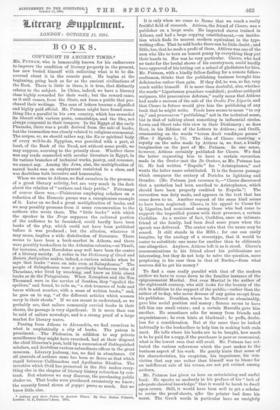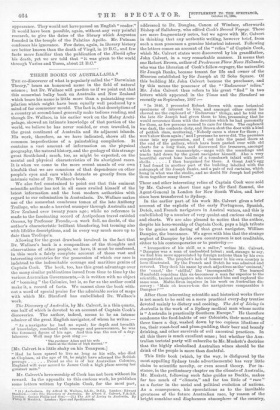BOOKS.
COPYRIGHT IN ANCIENT TIMES.* MR. PUTNAM, who is honourably known for his endeavours to improve the condition of literary property in the present, has now busied himself with collecting what is to be dis- covered about it in the remote past. He begins at the beginning, going back as far as the ancient civilisations of the East. There is little in these, it is true, that distinctly relates to the subject. In China, indeed, we have a literary class highly rewarded for their work; but the reward came, as it still comes, from the State, not from a public that pur- chased their writings. The man of letters became a dignified and highly paid official. Mr. Putnam might have found some- thing like a parallel in his own country, which has rewarded its literati with various poets, consulships, and the like, not always congenial to their tempers. In the Egypt of the early Pharaohs, there was a profit derived from the sale of books, but the transaction was closely related to religions ceremonial.
The corpse, or, we should rather say, the Ka or spiritual body of every well-to-do Egyptian, was provided with a part, at least, of the Book of the Dead, not without some profit, we may suppose, accruing to the priestly class. Whether there was any trade connected with secular literature in Egypt, in its various branches of technical works, poetry, and romance, we cannot say. Among the Jews, also, the multiplication of sacred books was an employment restricted to a class, and was doubtless both lucrative and honourable.
When we come to Athens, we find ourselves in the presence of a great literary activity, but are very much in the dark about the relation of "authors and their public." Patronage of course there was,—Pisistratus employing scholars on a redaction of the Homeric poems was a conspicuous example of it. Later on we find a great multiplication of books, and we may possibly presume from it some remuneration to the authors who wrote them. The "little books" with which the speaker in the Frogs supposes the cultured portion of the audience to be furnished, could hardly have been books of the play, which could not have been published before it was produced ; but the allusion, whatever it may mean, implies a wide distribution of literature. There seems to have been a book-market in Athens, and there were possibly booksellers in the Athenian colonies,—at Thurii, for instance, where Herodotus may well have been the centre of a literary society. A writer in the Dictionary of Greelc and Roman Antiquities makes, indeed, a curious mistake when he says that books "were on sale even at Salmydessue." The people of Salmydessus were a peculiarly barbarous tribe of Thracians, who lived by wrecking, and knew as little about books as do the Patagonians. When Xenophon and the Ten Thousand were in the service of Seethes, they "spoiled the spoilers," and found, be tells us, "a rich treasure of beds and boxes without number, with a mass of written books," and, he goes on to say, "of the different articles which seamen carry in their chests." If we are meant to understand, as we probably are, that sailors commonly carried books in their chests, the passage is very significant. It is more than can be said of sailors nowadays, and is a strong proof of a large market for literary wares.
Passing from Athens to Alexandria, we find ourselves in what is emphatically a city of books. The patron is prominent. The Ptolemies, in addition to any private munificence they might have exercised, had at their disposal the chief librarian's post, held by a succession of distinguished scholars, and doubtless various subordinate offices in the great museum. Literary jealousy, too, we find in abundance. Of all quarrels of authors none has been so fierce as that which raged between Oallimachus and Apollonius Rhodius. The invective which Ovid has preserved in the ibis makes every- thing else in the chapter of literary history colourless by con- trast. But whatever we may discover, the purchasing public eludes us. That books were purchased extensively we know ; the recently found stores of papyri prove so much. But we know little else.
* Authors and titer Public In Ancient Time, By Goo. Habon Putnam, London; G. P. Putnam's Sons, 1894.
It is only when we come to Rome that we reach a really fruitful field of research. Atticus, the friend of Cicero, was a publisher on a large scale. He imported slaves trained in Athens, and had a large copying establishment,--an institu- tion which finds its nearest modern equivalent in the type- writing office. That he sold books there can be little doubt ; and little, too, that he made a profit of them. Atticus was one of the men who like to turn an honest penny by everything they put their hands to. Nor was he very particular. Cicero, who had no taste for the brutal shows of his countrymen, could hardly have approved of his letting out a school of gladiators for hire. Mr. Putnam, with a kindly fellow-feeling for a remote fellow- craftsman, thinks that the publishing business brought him deficiencies rather than gain. If they did, he was, so far, very much unlike himself. It is more than doubtful, also, whether the words " Ligarianam praeclare vendidisti ; posthao quidquid soripsero, tibi praeconium deferam," really mean that Attious had made a success of the sale of the Oratio Pro Ligario, and that Cicero in future would give him the publishing of any book that he might write. "Paulo here seems to mean " to cry up," and praeconium " publishing," not in the technical sense, but in that of talking about something in influential circles. Lewis and Short take this view in their Dictionary ; so does Boot, in his Edition of the Letters to Attious; and Orelli, commenting on the words " totum ducit venditque poema " (Hor. 2 Epistle i., 75). The idea of Cicero receiving a royalty on the sales made by Attious is, we fear, a kindly imagination on the part of Mr. Putnam. In one sense, however, Atticus certainly published for Cicero. Wo find the latter requesting him to have a certain correction made in the Orator (not the De Orators, as Mr. Putnam has it). He had written " Eupolis" for "Aristophanes," and wants the latter name substituted. It is the famous passage which compares the oratory of Pericles to lightning and thunder. (Mr. Putnam just reverses it,—" Cicero discovered that a quotation had been ascribed to Aristophanes, which should have been properly credited to Eupolis.") The correction was duly made, and appears in the text that has come down to us. Another request of the same kind seems to have been neglected. Cioero, in his appeal to Omar for Q. Ligarius, had mentioned among those who had come to support the imperilled person with their presence, a oertain Oorfidins. As a matter of fact., Corfidius, once an intimate friend of the family, had been dead some years when the speech was delivered. The orator asks that the name may be erased. It still stands in the MSS. ; for one can easily imagine, by the analogy of a stereotype, that it would be easier to substitute one name for another than to obliterate one altogether. Anyhow, Atticus left it as it stood. Cicero's communications to his friend about his publications are interesting, but they do not help to solve the question, more perplexing in his case than in that of Burke,—from what sources did he get his money ?
To find a case really parallel with that of the modern author we have to come down to the familiar instance of the epigrammatist Martial. But even Martial is the author of the eighteenth century, who still looks for the bounty of the rich in addition to the support of the publio,—rather than the author of to-day, who never dreams of any gains except from his publisher. Domitian, whom he flattered so abominably, gave him social position and money ; Seneca seems to have left him one small estate ; and a certain Marcella gave him another. He sometimes asks for money from friends and acquaintances ; he even hints at blackmail ; he puffs, doubt- less for a consideration. But at the same time he looked habitually to the booksellers to help him in making both ends meet. He tells where his books are to be bought, how much is to be paid for a copy, if the purchaser is poor or economical, what is the lowest sum that will avail. Mr. Putnam has col- lected the various references which the poet makes to the business aspect of his work. He gently hints that some of his characteristics, his suspicion, his impatience, his con- viction that any one rather than himself was to blame for an indifferent sale of his verses, are not yet extinct among authors.
Mr. Putnam has given us here an entertaining and useful book. He speaks so modestly in his preface of his " lack of adequate classical knowledge," that it would be harsh to dwell upon errors. Still, it would have been well to get a scholar to revise the proof-sheets, after the printer had done his worst. The Greek words in particular have an unsightly
appearance. They would not have passed an English " reader." It would have been possible, again, without any very painful research, to give the dates of the library which Augustus founded in the temple of the Palatine Apollo. Mr. Putnam confesses his ignorance. Few dates, again, in literary history are better known than the death of Virgil, in 19 B.C., and few facts more familiar than the publication of the .1Eneid after his death, yet we are told that "it was given to the world through Varies and Tacca, about 21 B.C."



















































 Previous page
Previous page